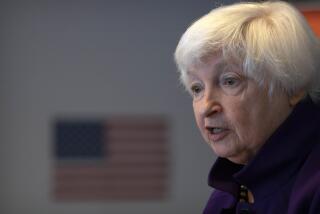U.S. Signals Easing of India Sanctions
- Share via
NEW DELHI — The United States is reviewing sanctions imposed on India after 1998 nuclear tests and they will likely be lifted after consultations with Congress, the chairman of the U.S. Joint Chiefs of Staff said here Thursday.
Indicating a substantial easing of the sanctions imposed by the Clinton administration, Army Gen. Henry H. Shelton said Washington is ready to resume military contacts and broaden defense cooperation with India.
“Sanctions are being reviewed in Washington, even as we speak. No decision has been made on that, although I think this will play out in time,” Shelton told senior Indian news editors in a briefing closed to the international media.
“We certainly realize the impact of the sanctions on the relationship,” he said, according to a tape of the meeting.
Shelton, the highest-ranking U.S. military officer to visit India since the South Asian nation’s nuclear tests, said sanctions “would be lifted after consultations with the U.S. Congress.”
Shelton said he was delighted that rivals India and Pakistan were talking after their summit this week and urged stronger military ties between India and the United States.
Although India and Pakistan reached no agreement, “we are delighted to see a dialogue between the two nations,” Shelton told reporters.
The summit between Indian Prime Minister Atal Behari Vajpayee and Pakistani President Gen. Pervez Musharraf ended this week with no communique because of a dispute over wording about the disputed region of Kashmir, which both nations claim.
After India and Pakistan conducted nuclear tests in 1998, the United States suspended military contacts and placed restrictions on the supply and sale of defense technology to both nations.
During his brief visit, Shelton met with Foreign Minister Jaswant Singh, National Security Advisor Brajesh Mishra and military officials.
Shelton said the visits reflect “an appreciation on both sides--India and the United States--to broaden and have a more substantive relationship.”
More to Read
Sign up for Essential California
The most important California stories and recommendations in your inbox every morning.
You may occasionally receive promotional content from the Los Angeles Times.













